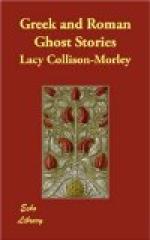On another occasion some strangers were playing at draughts near his shrine, when Ajax appeared and begged them to stop, as the game reminded him of Palamedes.
Hector was a far more dangerous person. Maximus of Tyre[39] says that the people of Ilium often see him bounding over the plain at dead of night in flashing armour—a truly Homeric picture. Maximus cannot, indeed, boast of having seen Hector, though he also has had his visions vouchsafed him. He had seen Castor and Pollux, like twin stars, above his ship, steering it through a storm. AEsculapius also he has seen—not in a dream, by Hercules, but with his waking eyes. But to return to Hector. Philostratus says that one day an unfortunate boy insulted him in the same way in which the shepherds had treated Ajax. Homer, however, did not satisfy this boy, and as a parting shaft he declared that the statue in Ilium did not really represent Hector, but Achilles. Nothing happened immediately, but not long afterwards, while the boy was driving a team of ponies, Hector appeared in the form of a warrior in a brook which was, as a rule, so small as not even to have a name. He was heard shouting in a foreign tongue as he pursued the boy in the stream, finally overtaking and drowning him with his ponies. The bodies were never afterwards recovered.
Philostratus gives us a quantity of details about the Homeric heroes, which the vine-dresser has picked up in his talks with Protesilaus. Most of the heroes can be easily recognized. Achilles, for instance, enters into conversation with various people, and goes out hunting. He can be recognized by his height and his beauty and his bright armour; and as he rushes past he is usually accompanied by a whirlwind—[Greek: podarkes, dios], even after death.
Then we hear the story of the White Isle. Helen and Achilles fell in love with one another, though they had never met—the one hidden in Egypt, the other fighting before Troy. There was no place near Troy suited for their eternal life together, so Thetis appealed to Poseidon to give them an island home of their own. Poseidon consented, and the White Isle rose up in the Black Sea, near the mouth of the Danube. There Achilles and Helen, the manliest of men and the most feminine of women, first met and first embraced; and Poseidon himself, and Amphitrite, and all the Nereids, and as many river gods and spirits as dwell near the Euxine and Maeotis, came to the wedding. The island is thickly covered with white trees and with elms, which grow in regular order round the shrine; and on it there dwell certain white birds, fragrant of the salt sea, which Achilles is said to have tamed to his will, so that they keep the glades cool, fanning them with their wings and scattering spray as they fly along the ground, scarce rising above it. To men sailing over the broad bosom of the sea the island is holy when they disembark, for it lies like a hospitable home to their ships.




